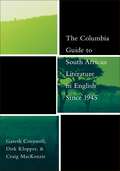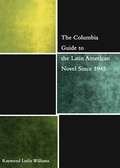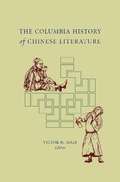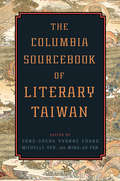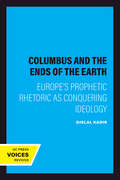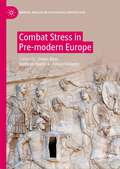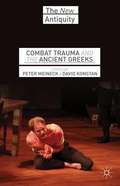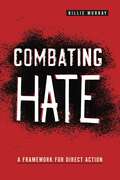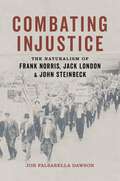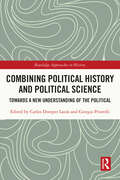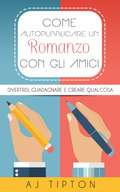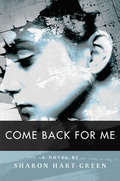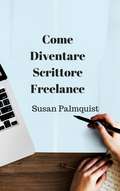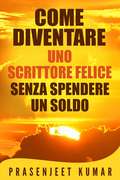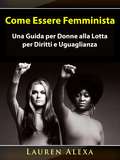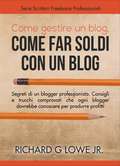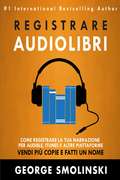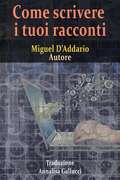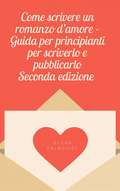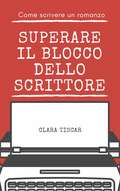- Table View
- List View
The Columbia Guide to South African Literature in English Since 1945 (The Columbia Guides to Literature Since 1945)
by Gareth Cornwell Dirk Klopper Craig MackenzieFrom the outset, South Africa's history has been marked by division and conflict along racial and ethnic lines. From 1948 until 1994, this division was formalized in the National Party's policy of apartheid. Because apartheid intruded on every aspect of private and public life, South African literature was preoccupied with the politics of race and social engineering. Since the release from prison of Nelson Mandela in 1990, South Africa has been a new nation-in-the-making, inspired by a nonracial idealism yet beset by poverty and violence. South African writers have responded in various ways to Njabulo Ndebele's call to "rediscover the ordinary." The result has been a kaleidoscope of texts in which evolving cultural forms and modes of identity are rearticulated and explored.An invaluable guide for general readers as well as scholars of African literary history, this comprehensive text celebrates the multiple traditions and exciting future of the South African voice. Although the South African Constitution of 1994 recognizes no fewer than eleven official languages, English has remained the country's literary lingua franca. This book offers a narrative overview of South African literary production in English from 1945 to the postapartheid present. An introduction identifies the most interesting and noteworthy writing from the period. Alphabetical entries provide accurate and objective information on genres and writers. An appendix lists essential authors published before 1945.
The Columbia Guide to Standard American English
by Kenneth G. WilsonA reliable and entertaining guide to effective writing and speaking for Americans, with some 6,500 concise, alphabetical entries that answer questions about word choice, meanings, pronunciations, spellings, grammatical forms and structures, and idiomatic expressions. Annotation c. by Book News, Inc., Portland, Or.
The Columbia Guide to the Latin American Novel Since 1945 (The Columbia Guides to Literature Since 1945)
by Raymond WilliamsIn this expertly crafted, richly detailed guide, Raymond Leslie Williams explores the cultural, political, and historical events that have shaped the Latin American and Caribbean novel since the end of World War II. In addition to works originally composed in English, Williams covers novels written in Spanish, Portuguese, French, Dutch, and Haitian Creole, and traces the profound influence of modernization, revolution, and democratization on the writing of this era.Beginning in 1945, Williams introduces major trends by region, including the Caribbean and U.S. Latino novel, the Mexican and Central American novel, the Andean novel, the Southern Cone novel, and the novel of Brazil. He discusses the rise of the modernist novel in the 1940s, led by Jorge Luis Borges's reaffirmation of the right of invention, and covers the advent of the postmodern generation of the 1990s in Brazil, the Generation of the "Crack" in Mexico, and the McOndo generation in other parts of Latin America. An alphabetical guide offers biographies of authors, coverage of major topics, and brief introductions to individual novels. It also addresses such areas as women's writing, Afro-Latin American writing, and magic realism. The guide's final section includes an annotated bibliography of introductory studies on the Latin American and Caribbean novel, national literary traditions, and the work of individual authors. From early attempts to synthesize postcolonial concerns with modernist aesthetics to the current focus on urban violence and globalization, The Columbia Guide to the Latin American Novel Since 1945 presents a comprehensive, accessible portrait of a thoroughly diverse and complex branch of world literature.
The Columbia Guide to the Latin American Novel Since 1945
by Raymond. WilliamsIn this expertly crafted, richly detailed guide, Raymond Leslie Williams explores the cultural, political, and historical events that have shaped the Latin American and Caribbean novel since the end of World War II. In addition to works originally composed in English, Williams covers novels written in Spanish, Portuguese, French, Dutch, and Haitian Creole, and traces the profound influence of modernization, revolution, and democratization on the writing of this era. Beginning in 1945, Williams introduces major trends by region, including the Caribbean and U.S. Latino novel, the Mexican and Central American novel, the Andean novel, the Southern Cone novel, and the novel of Brazil. He discusses the rise of the modernist novel in the 1940s, led by Jorge Luis Borges's reaffirmation of the right of invention, and covers the advent of the postmodern generation of the 1990s in Brazil, the Generation of the "Crack" in Mexico, and the McOndo generation in other parts of Latin America. An alphabetical guide offers biographies of authors, coverage of major topics, and brief introductions to individual novels. It also addresses such areas as women's writing, Afro-Latin American writing, and magic realism. The guide's final section includes an annotated bibliography of introductory studies on the Latin American and Caribbean novel, national literary traditions, and the work of individual authors. From early attempts to synthesize postcolonial concerns with modernist aesthetics to the current focus on urban violence and globalization, The Columbia Guide to the Latin American Novel Since 1945 presents a comprehensive, accessible portrait of a thoroughly diverse and complex branch of world literature.
The Columbia History of Chinese Literature
by Mair Victor H. Ed.The Columbia History of Chinese Literature is a comprehensive yet portable guide to China's vast literary traditions. Stretching from earliest times to the present, the text features original contributions by leading specialists working in all genres and periods. Chapters cover poetry, prose, fiction, and drama, and consider such contextual subjects as popular culture, the impact of religion, the role of women, and China's relationship with non-Sinitic languages and peoples. Opening with a major section on the linguistic and intellectual foundations of Chinese literature, the anthology traces the development of forms and movements over time, along with critical trends, and pays particular attention to the premodern canon.
The Columbia History of Chinese Literature
by Victor H. MairThe Columbia History of Chinese Literatureis a comprehensive yet portable guide to China's vast literary traditions. Stretching from earliest times to the present, the text features original contributions by leading specialists working in all genres and periods. Chapters cover poetry, prose, fiction, and drama, and consider such contextual subjects as popular culture, the impact of religion, the role of women, and China's relationship with non-Sinitic languages and peoples. Opening with a major section on the linguistic and intellectual foundations of Chinese literature, the anthology traces the development of forms and movements over time, along with critical trends, and pays particular attention to the premodern canon.
The Columbia Sourcebook of Literary Taiwan
by Chang Sung-Sheng Yvonne Yeh Michelle Fan Ming-JuThis sourcebook contains more than 160 documents and writings that reflect the development of Taiwanese literature from the early modern period to the twenty-first century. Selections include seminal essays in literary debates, polemics, and other landmark events; interviews, diaries, and letters by major authors; critical and retrospective essays by influential writers, editors, and scholars; transcripts of historical speeches and conferences; literary-society manifestos and inaugural journal prefaces; and governmental policy pronouncements that have significantly influenced Taiwanese literature. These texts illuminate Asia's experience with modernization, colonialism, and postcolonialism; the character of Taiwan's Cold War and post–Cold War cultural production; gender and environmental issues; indigenous movements; and the changes and challenges of the digital revolution. Taiwan's complex history with Dutch, Spanish, and Japanese colonization; strategic geopolitical position vis-à-vis China, Japan, and the United States; and status as a hub for the East-bound circulation of technological and popular-culture trends make the nation an excellent case study for a richer understanding of East Asian and modern global relations.
The Columbia Sourcebook of Literary Taiwan
by Chang Sung-Sheng Yvonne Yeh Michelle Fan Ming-JuContains more than 160 documents and writings that reflect the development of Taiwanese literature from the early modern period to the twenty-first century
The Columbia Sourcebook of Literary Taiwan
by Michelle Yeh Sung-sheng Yvonne Chang Ming-Ju FanThis sourcebook contains more than 160 documents and writings that reflect the development of Taiwanese literature from the early modern period to the twenty-first century. Selections include seminal essays in literary debates, polemics, and other landmark events; interviews, diaries, and letters by major authors; critical and retrospective essays by influential writers, editors, and scholars; transcripts of historical speeches and conferences; literary-society manifestos and inaugural journal prefaces; and governmental policy pronouncements that have significantly influenced Taiwanese literature.These texts illuminate Asia's experience with modernization, colonialism, and postcolonialism; the character of Taiwan's Cold War and post--Cold War cultural production; gender and environmental issues; indigenous movements; and the changes and challenges of the digital revolution. Taiwan's complex history with Dutch, Spanish, and Japanese colonization; strategic geopolitical position vis-à-vis China, Japan, and the United States; and status as a hub for the East-bound circulation of technological and popular-culture trends make the nation an excellent case study for a richer understanding of East Asian and modern global relations.
Columbus and the Ends of the Earth: Europe's Prophetic Rhetoric as Conquering Ideology
by Djelal KadirColumbus is the first blazing star in a constellation of European adventurers whose right to claim and conquer each land mass they encountered was absolutely unquestioned by their countrymen. How a system of religious beliefs made the taking of the New World possible and laudable is the focus of Kadir's timely review of the founding doctrines of empire.The language of prophecy and divine predestination fills the pronouncements of those who ventured across the Atlantic. The effects of such language and their implications for current theoretical debates about colonialism and decolonization are legion. Kadir suggests that in this supposedly postcolonial era, richer nations and the privileged still manipulate the rhetoric of conquest to justify and serve their own worldly ends. For colonized peoples who live today at the "ends of the earth," the age of exploitation may be no different from the age of exploration.
Combat Stress in Pre-modern Europe (Mental Health in Historical Perspective)
by Owen Rees Kathryn Hurlock Jason CrowleyThis book examines the lasting impact of war on individuals and their communities in pre-modern Europe. Research on combat stress in the modern era regularly draws upon the past for inspiration and validation, but to date no single volume has effectively scrutinised the universal nature of combat stress and its associated modern diagnoses. Highlighting the methodological obstacles of using modern medical and psychological models to understand pre-modern experiences, this book challenges existing studies and presents innovative new directions for future research. With cutting-edge contributions from experts in history, classics and medical humanities, the collection has a broad chronological focus, covering periods from Archaic Greece (c. sixth and early fifth century BCE) to the British Civil Wars (seventeenth century CE). Topics range from the methodological, such as the dangers of retrospective diagnosis and the applicability of Moral Injury to the past, to the conventionally historical, examining how combat stress and post-traumatic stress disorder may or may not have manifested in different time periods. With chapters focusing on combatants, women, children and the collective trauma of their communities, this collection will be of great interest to those researching the history of mental health in the pre-modern period.
Combat Trauma and the Ancient Greeks
by Peter Meineck David KonstanThis ground-breaking book applies trauma studies to the drama and literature of the ancient Greeks. Diverse essays explore how the Greeks responded to war and if what we now term "combat trauma," "post-traumatic stress," or "combat stress injury" can be discerned in ancient Greek culture.
Combating Hate: A Framework for Direct Action (Rhetoric and Democratic Deliberation)
by Billie MurrayThe United States has a hate problem. In recent years, hate speech has led not only to deep division in our politics but also to violence, murder, and even insurrection. And yet established constitutional jurisprudence holds that all speech is protected as “content neutral” and that the proper democratic response to hateful expression is not regulation but “more speech.” So how can ordinary citizens stand up to hate groups when the state will not?In Combating Hate, Billie Murray proposes an answer to this question. As a participant in anti-racist and anti-fascist protests, including demonstrations against the Ku Klux Klan, neo-Nazis, and the Westboro Baptist Church, Murray witnessed firsthand the limitations of the “more speech” approach as well as the combative tactics of anti-fascist activists. She argues that this latter group, commonly known as antifa, embodies a radically different strategy for combating hate, one that explodes the myth of content neutrality and reveals hate speech to be a tactic of fascist organizing with very real, highly anti-democratic consequences. Drawing on communication theory and this on-the-ground experience, Murray presents a new strategy, which she calls “allied tactics,” rooted in the commitment to affirm, support, and even protect those who are the victims of hate speech.Engaging and sophisticated, Combating Hate contends that there are concrete ways to fight hate speech from the front lines. Murray’s urgent argument that we reconsider how to confront and fight this blight on American life is essential reading for the current era.
Combating Injustice: The Naturalism of Frank Norris, Jack London, and John Steinbeck
by Jon Falsarella DawsonIn Combating Injustice, Jon Falsarella Dawson approaches American literary naturalism as a means of social criticism, exploring the powerful economic arguments and commentaries on labor struggles presented in novels by Frank Norris, Jack London, and John Steinbeck. Making use of extensive archival research, Dawson considers many of the original periodical sources that fueled books from McTeague to The Grapes of Wrath, as Norris, London, and Steinbeck transformed contemporary materials into illustrations of the socioeconomic forces that shape American life. By depicting the operations of powerful individuals and institutions, these naturalist writers offered audiences a greater awareness of the plight of labor so that readers might find the inspiration to become agents of change. Works such as The Octopus, The Iron Heel, Martin Eden, and In Dubious Battle illuminate many of the central economic issues at play in the United States during the late nineteenth and early twentieth centuries, including the rise of commodity culture, labor disputes involving industrial and agricultural workers, widespread poverty, extreme inequality, and the concentration of resources and land ownership. Norris, London, and Steinbeck highlighted the dangers of these developments by charting their impact on central characters whose fates result from the predatory tactics of corporate monopolies, wealthy individuals, and large financial establishments. Dawson’s lucid analysis shows how all three writers, drawing on contemporary events, accentuated the need for reform and stressed the potential for change by human action. Each author took inspiration from notable events in California, ranging from the Mussel Slough tragedy of 1880 to the agricultural strikes in the Central Valley during the 1930s, presenting the state as a microcosm for conditions throughout the nation during a period of tremendous upheaval. Combating Injustice: The Naturalism of Frank Norris, Jack London, and John Steinbeck provides carefully contextualized readings of three major writers whose works express both the necessity for and the possibility of creating a more egalitarian society.
Combining Political History and Political Science: Towards a New Understanding of the Political (Routledge Approaches to History #52)
by Carlos Domper Lasús Giorgia PriorelliThis book shows how a multidisciplinary approach combining conceptual and methodological tools from political history and political science can help to develop a deeper understanding of contemporary political phenomena including democracy, populism, war, and forced migrations, among others. Throughout the eleven chapters, the volume brings together senior academics and early-career scholars to explore this innovative approach through a broad range of case studies which are not specific to any particular nation but are characteristic of contemporaneity worldwide. Both the international character and the interdisciplinary appeal of this book are reinforced by the fact that the editors and contributors come from different countries and diverse academic traditions. This book is aimed at scholars, researchers and postgraduate students interested in interdisciplinary approaches and working on politics and global phenomena in the twentieth and twenty-first centuries.
Come Autopubblicare un Romanzo con gli Amici
by Aj Tipton Benedetta AlciatoSei pronto a divertirti e guadagnare autopubblicando con gli amici? Scrivere può essere un lavoro difficile, solitario se fatto da soli. Ma non deve essere per forza così. Ti offriamo un metodo di autopubblicazione collaborativo e divertente. Se stai iniziando a conoscere il mondo dell’autopubblicazione, o hai già iniziato, questa è la guida per te! Come Autopubblicare Romanzi con gli Amici è un progetto indispensabile per trasformare le tue idee di storia in lavori pubblicati. Vogliamo salvarti dalla frustrazione e solitudine di provare a fare tutto da solo. AJ Tipton è un team di grande successo nell’autopubblicazione, ed abbiamo l’intenzione di rivelarti i nostri segreti, le lezioni guadagnate lavorando sodo, ed i trucchi che abbiamo imparato su questo eccitante mondo. Questo libro include: + Il modo migliore per scegliere il tuo coautore + Come scegliere genere e sottogenere + Un metodo a prova di errore per creare storie che vendono + Una guida interna per assumere freelance per l’editing, la creazione della copertina, le traduzioni, e molto altro + Trucchi di formattazione ed editing + Piattaforme di pubblicazione e domande da fare: Amazon, Kindle Unlimited, Nook, ecc. + I pro e i contro della traduzione del tuo libro + Come creare – ed usare – il tuo budget + Trucchi per un marketing di successo + Il potere dei social media + Come mantenere la tua collaborazione vantaggiosa, condividere il lavoro, e continuare a scrivere insieme E molto altro ancora! Se sei pronto ad essere creativo e a scrivere con gli amici, leggi questa guida punto per punto per iniziare ora il tuo viaggio verso l’autopubblicazione di successo!
Come Back for Me
by Sharon Hart-GreenLoss, trauma, memory, and, above all, the ties of family and being Jewish are the elements that weave together this panoramic story. Come Back for Me travels through time and place only to bring us, ultimately, to the connections between generations. Artur Mandelkorn is a young Hungarian Holocaust survivor whose desperate quest to find his sister takes him to post-war Israel. Intersecting Artur's tale is that of Suzy Kohn, a Toronto teenager whose seemingly tranquil life is shattered when her uncle's sudden death tears her family apart. Their stories eventually come together in Israel following the Six-Day War, where love and understanding become the threads that bind the two narratives together. Like Sarah's Key, Come Back for Me deals evocatively with the scars left by tragedy and the possibilities for healing.
Come diventare scrittore freelance
by Susan PalmquistChe sia per guadagnare un piccolo extra, per renderlo un lavoro full-time, per avere un trampolino di lancio prima di iniziare a scrivere libri… Hai mai pensato di diventare uno scrittore freelance? Se la risposta è sì, questo libro è fatto apposta per te. Imparerai: come creare un portfolio; come procurarti i primi agganci senza esperienza pregressa; l’importanza dello studio del tuo mercato d’interesse e il modo in cui farlo perché ti sia d’aiuto; i tipi di scrittura freelance; come raccogliere le idee; come fare il primo passo nel modo giusto; a lavorare con i redattori; cosa fare una volta ottenuto l’incarico; come trovare e intervistare gli esperti giusti per il tuo articolo; come fare per continuare a ricevere incarichi; a gestire tempo e introiti.
Come Diventare Uno Scrittore Felice Senza Spendere Un Soldo
by Prasenjeet Kumar Dino De MaioDa Prasenjeet Kumar, l’autore di bestseller # 1 della serie “Autopubblicazione SENZA SPENDERE UN SOLDO” un vero e proprio manuale per vivere felicemente la professione di scrittore. Da come trovare la fonte d'ispirazione alla necessità di essere indulgenti con se stessi e lasciar da parte la critica a favore dei sogni, lo scrittore ci mostra come diffidare di corsi di scrittura creativa, editor e agenti letterari e dar sfogo alla propria creatività senza timori. Nella logica del SENZA SPENDERE UN SOLDO ci insegna a come farci creare una splendida copertina per il nostro libro a soli 5 dollari e ci invita a non diventare schiavi del controllo delle vendite. Passa poi a parlare della promozione che è necessaria, ma non deve diventare un'ulteriore fonte d'angoscia e di come stare alla larga dai truffatori in rete e fuori. Ci parla poi dei miracolosi risultati che si ottengono con il cosiddetto Effetto Composto ovvero di come tanti piccoli passi portino alla lunga ai risultati sperati. Alla fine della lettura avrai imparato molti segreti importanti sull'arte dello scrivere ma, soprattutto, se li metterai in pratica potrai diventare UNO SCRITTORE PIÙ FELICE!
Come Essere Femminista: Una Guida per Donne alla Lotta per Diritti e Uguaglianza
by Lauren AlexaSei mai stata vittima di violenza, odio, molestie e sofferenza dovuti al tuo sesso di appartenenza? Essere femminista e praticare gli ideali femministi significa combattere per cose importanti. Parità di salario, essere trattate con rispetto, tutela del congedo di maternità, diritti riproduttivi, violenza domestica e molto altro. Se desideri saperne di più sulla lotta per i tuoi diritti e per aiutare le donne di tutto il mondo a combattere per i propri, allora questa guida fa al caso tuo. - Impara a essere femminista. - Impara a combattere per i tuoi diritti. - Lotta per l’uguaglianza e per la parità di salario. - E Molto Altro! Scopri come fare per stare dalla parte giusta della nostra storia, aiutando l’umanità dov’è più necessario! --> Scorri verso la parte alta della pagina e clicca su “aggiungi al carrello” per effettuare immediatamente l’acquisto Disclaimer: L’autrice e/o i titolari dei diritti non avanzano pretese, promesse o garanzie relativamente all’accuratezza, alla completezza o all’adeguatezza dei contenuti di questo libro, e declinano espressamente qualsiasi responsabilità legata a eventuali errori od omissioni presenti. Il prodotto va inteso solo come riferimento. Si prega di consultare un/una professionista prima di agire sulla base dei contenuti ivi compresi.
Come gestire un blog, Come far soldi con un blog.
by Ylenia Patuzzi Richard G Lowe JrC'è un'arte nello scrivere un articolo che ha la proprietà di invogliare il lettore ad agire. Questo è il filo conduttore del libro che state leggendo sul vostro Kindle proprio ora. Qui, imparerete come si crea un articolo che ottenga l'interesse del lettore, lo affascini, lo informi e lo spinga a prendere una decisione entro la fine della lettura. Il libro che state leggendo descrive i metodi che uso per creare articoli per blog che hanno lo specifico obiettivo di operare su una persona dal momento in cui clicca sul link fino a che preme il bottone compra o sottoscrivi sul fondo della pagina. Imparerai: * Come creare un titolo che attira il lettone nel tuo articolo * Cosa mettere "sopra la piega" * Aggiungere innesti emozionali * Connetterti coi tuoi lettori * Cos'altro aggiungere al tuo articolo * Far si che premano "Compra" * Quanto sono importanti le immagini? * E i video?
Come registrare il tuo audiolibro per Audible, iTunes, ed altre piattaforme
by Mattia Baratto George SmolinskiQuesta è una guida completa con istruzioni video che vi permetterà di registrare il vostro audiolibro. Lo so perchè ho utilizzato QUESTE STESSE TECNICHE per registrare questo stesso libro per Audible! Gli audiolibri sono la più grande novità nell'ambito delle pubblizazioni oggigiorno. C'è stata una crescita esplosiva di vendite di audiolibri negli ultimi 4 anni, e voi dovete avere il vostro libro in formato audio. Questa guida vi insegnerà gli ingressi e le uscite della registrazione di audiolibri, anche se lo volete fare da soli! Argomenti discussi in questa guida: 1. L'equipaggiamento necessario per registrare audiolibri e narrazioni 2. Come iniziare a registrare audiolibri con GarageBand e Audacity 3. Consigrli e trucchi per aiutarvi partire con il piede giusto nella narrazione di audiolibri 4. Come caricare il vostro libro finito su Audible e iTunes libri 5. Risorse utili per far produrre il vostro audiolibro se non siete bravi con il fai-da-te
Come scrivere i tuoi racconti
by Miguel D'AddarioCONTENUTI - Obiettivi Narrare distinti testi letterari.Punti di vista, dialoghi, spazio, tempo. Conoscere le basi del racconto come genere letterario. Scoprire la struttura d’approccio, il nodo e la soluzione. - Metodologia Proposta d’analisi di determinati racconti. Partecipazione attiva inerente alle proposte offerte. Le proposte di lavoro vengono intese da un punto di vista descrittivo in modo da poter analizzare diversi tipi di testo. Il corso è suddiviso nelle seguenti parti: analisi del racconto, struttura, genere, spazio e tempo, personaggi, esercizi scritti per gli alunni del corso, scrittura e produzione di un testo personale. - Programma Primo avvicinamento al concetto di racconto. Lo scrittore come ricettore ed emittente. Lettura ed analisi di un racconto. L’invenzione di un mondo possibile. Elaborazione della finzione a partire da una situazione quotidiana. Proposta di scrittura. L’importanza della propria esperienza intesa come impulso per una scrittura creativa. La consistenza dei ricordi (riguardanti i vicini o i conoscenti). Proposta di scrittura. La manipolazione della realtà e della propria esperienza: elaborazione dei racconti. Proposta di scrittura. I punti di vista e la persona narrativa. Analisi dei racconti. Proposta di scrittura. Il racconto, il racconto breve. Proposta di scrittura. Linee guida per la creazione di racconti. Quadri riassuntivi.
Come scrivere un romanzo d'amore - Guida per principianti per scriverlo e pubblicarlo
by Susan Palmquist Maria De BonisHai mai sognato di scrivere un romanzo d’amore? In questa seconda edizione di “Come scrivere un romanzo d’amore”, imparerai suggerimenti e trucchi per cominciare a scrivere la tua storia, completarla e proporla a un editore o agente. Imparerai: -Come inventare idee per delle storie -Come pianificare il tuo romanzo -L’importanza dei primi tre capitoli -Come creare il conflitto -Come aumentare l’emozione nella storia -Come creare personaggi e dialoghi che affascinano il lettore -Come creare la tensione sessuale -Come preparare una proposta che si faccia notare -Luoghi dove proporre le tue storie -Suggerimenti di scrittura per trovare l’ispirazione Se hai mai voluto imparare il mestiere dello scrittore ma non hai mai avuto il tempo o il budget necessario per frequentare un seminario, questo libro ti offre tutto ciò di cui hai bisogno per cominciare.
Come scrivere un romanzo - Superare il blocco dello scrittore
by Clara Tiscar Corrado PastoreVuoi scrivere ma soffri di una sorta di blocco? Provi una sensazione di panico di fronte alla pagina bianca? Se ti identifichi con le seguenti affermazioni, questo libro fa proprio al caso tuo: Voglio incominciare a scrivere ma non trovo il momento giusto Sono bloccato con il mio romanzo e non so come uscirne Ho chiara la storia che voglio raccontare ma non riesco a scriverla Non sono bloccato ma mi manca la motivazione per andare avanti a scrivere il mio romanzo Se applichi correttamente le tecniche, superare il blocco sarà molto più facile e divertente di quanto credi. Inoltre, imparerai nuovi metodi di lavoro che faranno sì che tu non ti permetteranno di non sentirti più bloccato in futuro.
